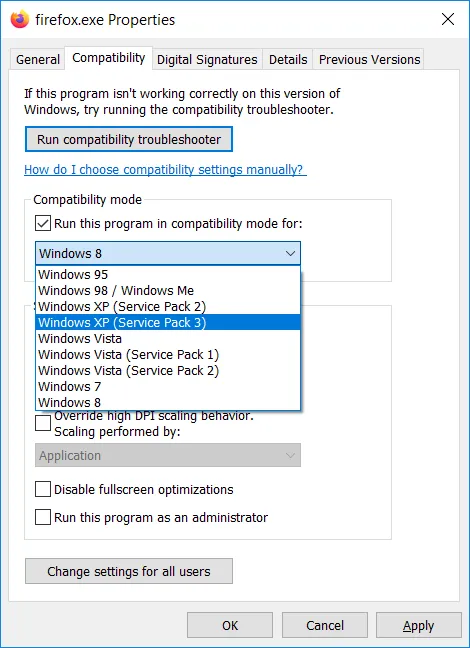我需要在旧版本的VS编译器中工作,而且还要在Qt框架内进行。下面是我如何实现的。
将GetWinVersion.h文件添加到您的Qt项目中:
#ifndef GETWINVERSION
#define GETWINVERSION
#include <QtGlobal>
#ifdef Q_OS_WIN
#include <windows.h>
#include <stdio.h>
float GetWinVersion()
{
OSVERSIONINFO osvi;
ZeroMemory( &osvi, sizeof(OSVERSIONINFO) );
osvi.dwOSVersionInfoSize = sizeof(OSVERSIONINFO);
return GetVersionEx( &osvi ) ?
(float)osvi.dwMajorVersion +
((float)osvi.dwMinorVersion/10) :
0.0 ;
}
#endif
#endif
在您的pro或pri qmake文件中添加所需的链接:
msvc: LIBS += -lKernel32
实现辅助函数如下(注意这里使用的SystemInfo是我的自定义类,但你可以理解为...):
#include "GetWinVersion.h"
SystemInfo info;
#ifdef Q_OS_WIN
info.setPlatform( SystemInfo::WINDOWS );
switch(QSysInfo::windowsVersion())
{
case QSysInfo::WV_32s: info.setOsName( L"3.1" ); info.setOsVersion( 3.1 ); break;
case QSysInfo::WV_95: info.setOsName( L"95" ); info.setOsVersion( 4.0 ); break;
case QSysInfo::WV_98: info.setOsName( L"98" ); info.setOsVersion( 4.1 ); break;
case QSysInfo::WV_Me: info.setOsName( L"Me" ); info.setOsVersion( 4.9 ); break;
case QSysInfo::WV_NT: info.setOsName( L"NT" ); info.setOsVersion( 4.0 ); break;
case QSysInfo::WV_2000: info.setOsName( L"2000" ); info.setOsVersion( 5.0 ); break;
case QSysInfo::WV_XP: info.setOsName( L"XP" ); info.setOsVersion( 5.1 ); break;
case QSysInfo::WV_2003: info.setOsName( L"2003" ); info.setOsVersion( 5.2 ); break;
case QSysInfo::WV_VISTA: info.setOsName( L"Vista" ); info.setOsVersion( 6.0 ); break;
case QSysInfo::WV_WINDOWS7: info.setOsName( L"7" ); info.setOsVersion( 6.1 ); break;
case QSysInfo::WV_WINDOWS8: info.setOsName( L"8" ); info.setOsVersion( 6.2 ); break;
default:
info.setOsVersion( GetWinVersion() );
if( info.osVersion() == 6.3f )
info.setOsName( L"8.1" );
else if( info.osVersion() == 10.0f )
info.setOsName( L"10" );
else
info.setOsName( L"UNKNOWN" );
}
info.setOsBits( IsWow64() ? 64 : 32 );
#else
...
现在,这里是真正的关键。您需要将一个清单文件附加到您的exe文件上,以“针对”最近的Windows版本,否则您无法检测到它们(请参见MS文档:
https://msdn.microsoft.com/en-us/library/windows/desktop/ms724451%28v=vs.85%29.aspx)。以下是一个示例清单文件:
<?xml version="1.0" encoding="UTF-8" standalone="yes"?>
<assembly xmlns="urn:schemas-microsoft-com:asm.v1" manifestVersion="1.0">
<assemblyIdentity
name="MyOrg.MyDept.MyAppName"
version="1.0.0.0"
processorArchitecture="x86"
type="win32" />
<compatibility xmlns="urn:schemas-microsoft-com:compatibility.v1">
<application>
<supportedOS Id="{8e0f7a12-bfb3-4fe8-b9a5-48fd50a15a9a}"/>
<supportedOS Id="{1f676c76-80e1-4239-95bb-83d0f6d0da78}"/>
<supportedOS Id="{4a2f28e3-53b9-4441-ba9c-d69d4a4a6e38}"/>
<supportedOS Id="{35138b9a-5d96-4fbd-8e2d-a2440225f93a}"/>
<supportedOS Id="{e2011457-1546-43c5-a5fe-008deee3d3f0}"/>
</application>
</compatibility>
</assembly>
以下是附加清单的批处理代码:
set exeFile=MyApp.exe
set manifestFile=MyApp.manifest
set manifestExe=C:\Program Files (x86)\Microsoft SDKs\Windows\v7.0A\bin\x64\mt.exe
"%manifestExe%" -manifest "%manifestFile%" -outputresource:"%exeFile%"
理论上,您可以使用qmake运行最后一部分并附加清单。我没有运用我找到的例子成功,现在只能通过这个批处理来“作弊”...

kernel32.dll)中读取。 - Ben Voigt